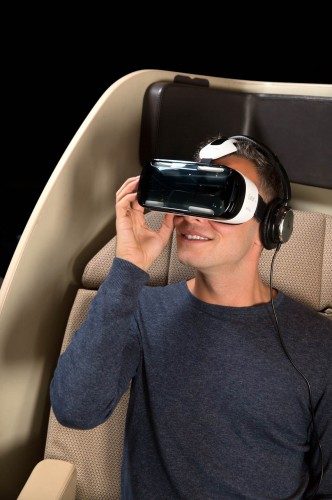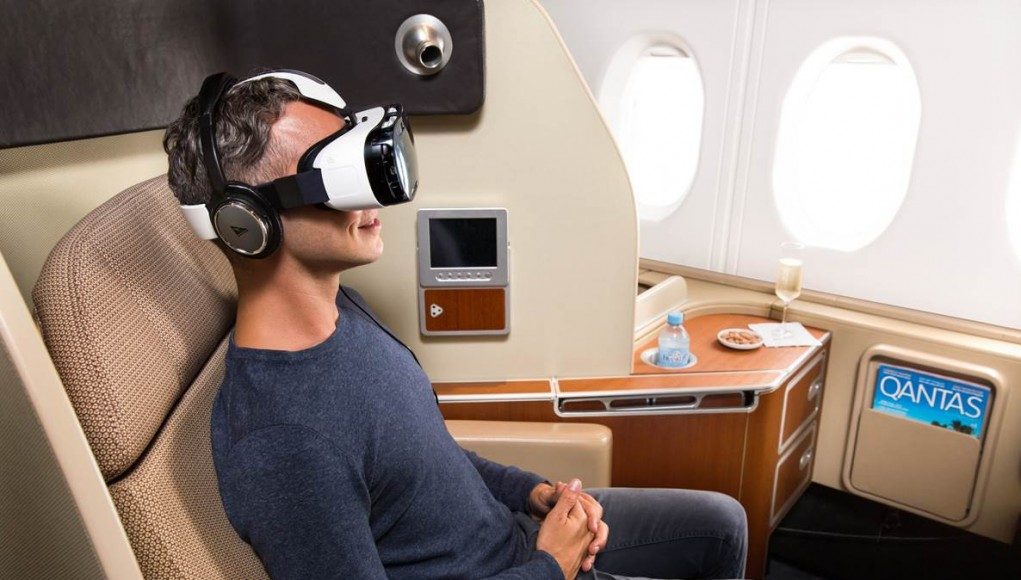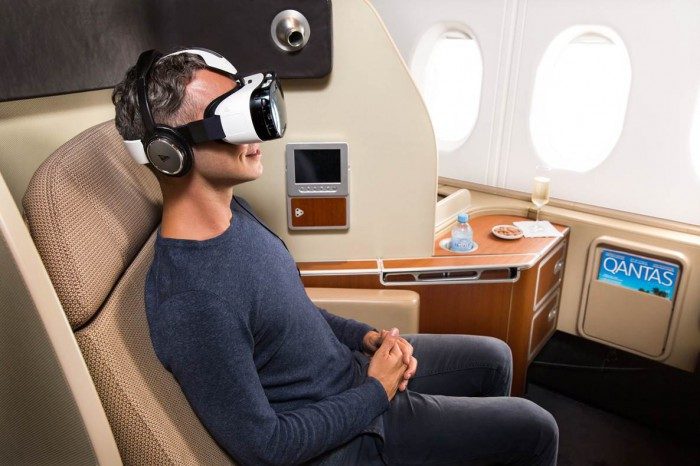First class passengers on Qantas Airlines will be getting quite the surprise to go along with their eight-course tasting menu, made-to-order signature dishes from Chef Neil Perry, award-winning wine and champagnes, leaf tea and espresso coffee, cotton pajamas, slippers, skincare products, toiletries, eye mask, noise-cancelling headsets, and open access to the First Class Lounge in Sydney and Melbourne so they can enjoy complimentary treatments at Qantas’ luxurious Aurora Day Spa. They’re getting Gear VR, which is nice too.
Samsung Electronics Australia has partnered up with Qantas Airlines to give the very first in-flight offering of VR entertainment. The Australian airline is currently in the middle of a three-month testing phase, which uses Samsung Gear VR and Galaxy Note 4 combo to give first class customers a chance to sample what could be their first interaction with virtual reality.
And they aren’t just tossing unsuspecting passengers into a head-spinning game of Dreadhalls it seems (the barf bag is also complimentary). The in-flight VR program will feature a host of preloaded “vignettes” created by Jaunt, the cinematic VR company that also produced Paul McCartney’s ‘Live and Let Die‘ 360 concert experience for Google Cardboard.
See Also: Inside Look: Jaunt Pulls in $6.8 Million in Venture Funding for Virtual Reality Cinema Toolset
The custom-made VR content from Jaunt—giving passengers a 3D 360 degree virtual look at Qantas’ ultramodern first class lounge in LAX, a flight take off and landing, a visit atop Sydney Harbor Bridge, and a serene boat ride down a Northern Territory river in Kakadu National Park—may sound fairly tame to the standard VR enthusiast, but it’s really the sort of sampling you’d feel comfortable throwing at a cabin-full of beginners. Not to mention the basic benefit of being able to tour your destination virtually before you even leave the concourse.
We think that cinematic VR travel and destination videos are a fantastic option for customers on any flight. It is easy to lose yourself in the content, forgetting about the outer world. Omnidirectional sounds present themselves as they would in real life, completing a sense of deep immersion and escape. Since we are presenting video at 60 frames per second, processing requirements on the Note 4 at the heart of Gear VR are quite low. This allows for smooth, nausea free playback — an important criteria of course at any altitude,” said Scott Broock, VP of content at Jaunt.
The content isn’t going to be available to the general public though, and will only be accessible through a stand-alone app exclusive to Qantas handsets.
 In addition to Jaunt’s 360 stereoscopic videos, Qantas is also loading a few in-flight movies on the loaner VR headsets, so passengers can watch on Oculus Cinema’s giant virtual theater screen. But what about when the Note 4 driving the VR headset overheats, flashing the inevitable ‘cool down’ message in the middle of a movie? Or what if it runs out of battery first? We haven’t heard anything verifiable yet, but to keep passengers consuming unabated, Qantas will probably be bringing a fat stack of fresh Note 4s (in ‘flight mode’ obviously) just in case.
In addition to Jaunt’s 360 stereoscopic videos, Qantas is also loading a few in-flight movies on the loaner VR headsets, so passengers can watch on Oculus Cinema’s giant virtual theater screen. But what about when the Note 4 driving the VR headset overheats, flashing the inevitable ‘cool down’ message in the middle of a movie? Or what if it runs out of battery first? We haven’t heard anything verifiable yet, but to keep passengers consuming unabated, Qantas will probably be bringing a fat stack of fresh Note 4s (in ‘flight mode’ obviously) just in case.
Figuring out the nuances of getting Gear VR, undeniably a developer kit replete with finickey bits like a fixed interpupillary distance, and making it available to the general public is precisely why the program is going through a trail period before its mid-March launch of the full service. We can guess that the uninitiated will definitely want to try it, if only out of boredom on their long-haul from Sydney to LA, but will it become popular enough to justify making it a standard addition to the flying process?
Unfortunately we don’t see VR in its current form escaping to the back of the plane with the plebeians (and Road to VR staff), because it still requires too much explaining, and the white glove support staff that only luxury class travel can provide.








